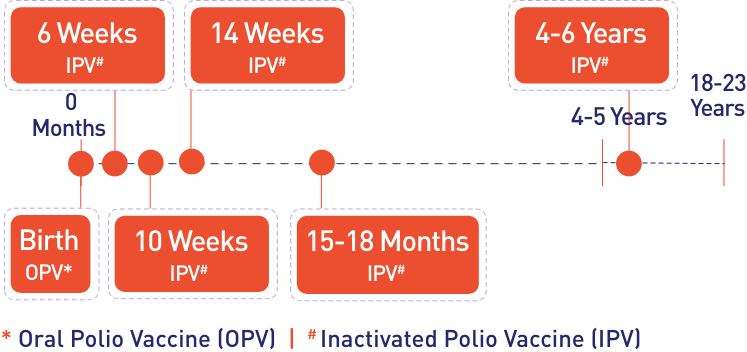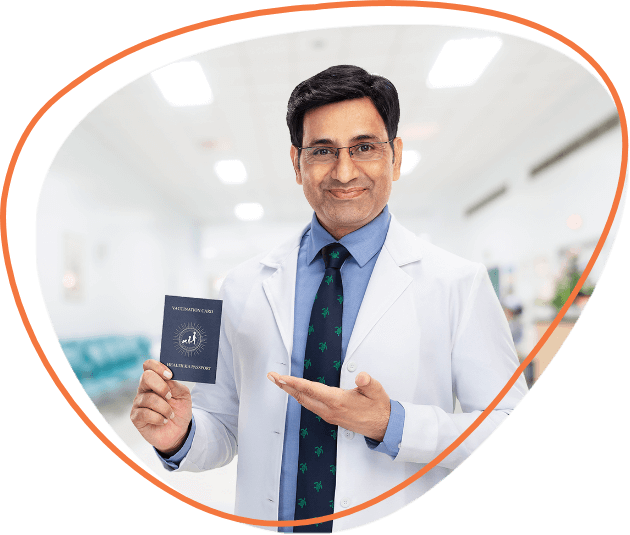No, there is no cure for Polio. Polio can be prevented by immunizing a child with appropriate vaccination.


You are now leaving GSK’s website and are going to a website that is not operated/controlled by GSK. Though we feel it could be useful to you,we are not responsible for the content/service or availability of linked sites. You are therefore mindful of these risks and have decided to go ahead.
Agree Agree Agree Stay
Polio, or poliomyelitis, is an infectious viral disease that may lead to paralysis, one of the permanent disability, and even death. Polio Vaccination is an effective way to protect against the disease.
Is your child fully protected? The 7-Star Protection Program offers essential protection with seven critical vaccinations against serious diseases like Polio, Chickenpox, Flu, Hepatitis A, Rubella, Meningitis, and more. These vaccinations, administered at the recommended ages, build strong immunity and lower the risk of severe health complications.
Don't risk their health - consult a paediatrician today to ensure your child receives all 7-Star Protection. A healthier future starts with prevention.

If you miss out the dose of these vaccinations during the stipulated time, you can consult with your doctor for a Catch-up Vaccination.
Talk to your doctor about the Polio Vaccination.
Poliomyelitis, a disease caused by the poliovirus, is commonly known as polio. It mainly affects children and depending on its severity, can lead to paralysis and death. Apart from this, survivors are also affected with post-polio syndrome. They experience muscle pain, weakness, and paralysis about 15 to 40 years after the infection.
Poliovirus is highly contagious and hence, can spread easily from person to person. It spreads in the following ways:
An infected person can even spread the virus to others before or up to 2 weeks after the symptoms appear. Asymptomatic people can also pass on the poliovirus.
Not everyone infected with the poliovirus will show the symptoms. However, about 1 in every four infected people will show symptoms similar to the ones seen in someone down with the flu.
These include:
These are milder symptoms and will usually not last more than 2 to 5 days. Depending on the severity of the infection, some may experience severe symptoms that affect the spine and the brain, such as:
The first dose of Oral Polio Vaccine (OPV) is given to a child at birth.
Following birth dose of OPV, Injectable Inactivated Polio Virus (IPV)-containing vaccines are important and routinely recommended for a child from 6 weeks onwards. These IPV-containing vaccines are available as a standalone or in combination. In addition, all parents are advised to ensure that their children receive OPV during the national and subnational pulse polio days.
However, consult your doctor for more information.
With any medicine, including vaccines, there is a chance of side effects. These are usually mild and go away on their own.
Some people who get IPV get a sore spot where the shot was given and injection site pain. IPV has not been known to cause serious problems, and most people do not have any problems with it.

No, there is no cure for Polio. Polio can be prevented by immunizing a child with appropriate vaccination.
A public awareness initiative by GlaxoSmithKline Pharmaceuticals Limited. Dr. Annie Besant Road, Worli, Mumbai 400 030, India.
Information appearing in this material is for general awareness only. Nothing contained in this material constitutes medical advice. Please consult your doctor for any medical queries, any question or concern you may have regarding your condition. The disease list indicated for vaccination is not complete, please consult your child’s Paediatrician for the complete vaccination schedule. The doctor shown in this material is being used for illustrative purpose only and is a professional model. The disease representation icons/images and animation are for illustrative purpose only.